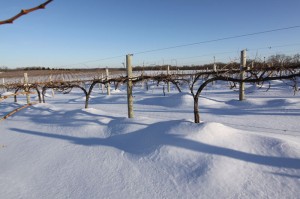Deep Waiting
 I have finally figured out who is buried in my backyard in Chicago. It is Robert the Bruce; I can tell by looking at the grapevines, for grapevines drink the blood of the body beneath them, expressing its spirit and revealing its identity. Our grapevines muscle over the fences and trample the little factions of squash and scale the four-story building next door. And whoever was that indefatigable but Robert the Bruce? Sometimes the vines springing from the great Scot almost subordinate me, too–in the summer I have to bicycle out the back door at full pedal, outracing the tendrils grabbing at my ankles and spokes. I am not inclined to crush and press those little blue grapes, for blood that righteous–what sort of vessel could keep it bottled up, what kind of person could down it?
I have finally figured out who is buried in my backyard in Chicago. It is Robert the Bruce; I can tell by looking at the grapevines, for grapevines drink the blood of the body beneath them, expressing its spirit and revealing its identity. Our grapevines muscle over the fences and trample the little factions of squash and scale the four-story building next door. And whoever was that indefatigable but Robert the Bruce? Sometimes the vines springing from the great Scot almost subordinate me, too–in the summer I have to bicycle out the back door at full pedal, outracing the tendrils grabbing at my ankles and spokes. I am not inclined to crush and press those little blue grapes, for blood that righteous–what sort of vessel could keep it bottled up, what kind of person could down it?
In fact the whole Midwest seems to be sown with the bodies of zealots and swashbucklers and other fervent figures, since our yards and woods are writhing with these vigorous wild grapes. Pinot Noir does not grow wild here; Pinot Noir, Gamay, Chardonnay, are Frenchier grapes that appear to issue from the remains of Little Miss Muffet. Sweet as she was, Little Miss Muffet would not have wintered well in Minnesota: she would have whimpered, frozen stiff, and fallen off her tuffet.
But somehow, someone convinced wild ruffian grapes and fussy French grapes to mix their roots together, and now the fruits of this association are thriving in local vineyards. Robert the Bruce and Little Miss Muffet got married and moved to Wisconsin. “Take courage, Miss Muffet! Together we will be both sweet and hearty! You can show me how to be palatable and I will show you how to survive a Northland winter! Being brave is not just about storming the countryside in June; it also consists of deep waiting–waiting, through the long winter, for the warming star to return. In October we will drop our leaves and go to sleep; we will squeeze the water out of our cells so they don’t explode when the killing frosts come; we will turn brown and dry, so that we will not freeze inside. However fringed in icicles we become, however snowy our sleeves, we must not freeze on the inside, my dear Miss Muffet–not in our pith.” What he says to her is true; in the winter I don’t have to sprint through my yard for fear of subjugation; I can walk right up to those sinewy climbers, for they are suspended–withered brown twigs encased in glassy layers of ice.
Some contemporaries claim that our planetary system is no longer heliocentric. Just as the geocentric system once gave way to the heliocentric system, now the heliocentric system has given way to the saturnocentric system. The great giver of light is no longer the major influence around here; now we are to orient ourselves around Saturn, that dim and gloomy planet, and to venerate dullness and dreariness and shivering despair.
But grapes are our contemporaries, too, and may be some of the wisest–certainly they are some of the bravest. Though the winter be long and harsh, they refuse to give their hearts to ice; for they believe that the star will come back, the vintner star, when they can turn green again and start throwing their shoots about, proliferating into huge green canopies, culminating in heavy bunches of sweet burgundy fruit. Worship Saturn all you wish, but he will never turn one drop of your water into wine.
Amy Leach lives in Chicago and is the recipient of the 2010 Whiting Writer’s Award, a Ronna Jaffe Award, a Best American Essays selection and a Pushcart Prize. She received an MFA from the University of Iowa. Amy currently teaches writing at both Northwestern and Loyola Universities. Her book “Things That Are” will be published by Milkweed Editions in June and can be ordered at http://www.milkweed.org/
Photo: Creekbend Vineyard, Southern Indiana. Courtesy of Oliver Winery, Bloomington, Indiana.

